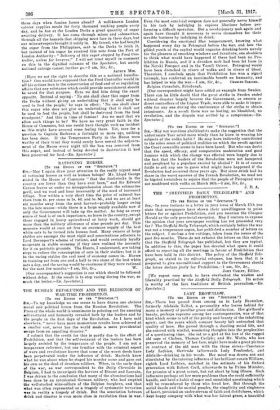RATIONING HORSES.
[To THE EDITOR Or THE " SPECTATOR.")
Era,—May I again draw your attention to the really urgent need of rationing horses as well as human beings? Mr. Lloyd George stated in the House of Commons " that the food-stocks in the country are lower than they have ever been," and Sir Edward Carson leaves us under no misapprehension about the submarine peril, and we read and hear incessantly of the need of increased tillage. Now within a very short time the price of oatmeal has risen from 4s. per stone to 55. 4d. and 5s. 8d., and we are at least six months away from the next harvest—probably longer owing to the late season—while there is a large supply available now if only the Government will take up the matter. As long as every ounce of food is of such importance, no horse in the country, except those engaged in heavy agricultural or lorry work, should get more than the military allowance of nine pounds per day. This measure would at once set free an enormous supply of the best white oats to be turned into human food. Many owners of large stables are amongst the most rigid and conscientious adherers to Lord Devonport's scheme of rations, and would certainly loyally co-operate in stable economy if they once realized the necessity for it on patriotic grounds. The Hunts, I understand, are taking steps to reduce the consumption of oats in their stables; but it is in the racing stables the real need of economy comes in. Horses in training eat from one and a half to two stone of the best white oats a day, and the saving would be enormous if they were rationed for the next few months.—I am, Sir, he., W. [Our correspondent's suggestion is one which should be followed without delay. If the result is to stop racing during the war, so much the better.—En. Spectator.]


























 Previous page
Previous page